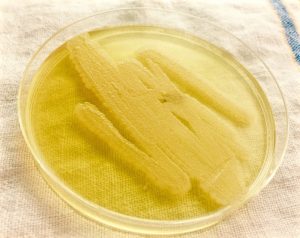Scientists at the University of Edinburgh have released a paper published in Applied and Environmental Microbiology showing that methicillin-resistant Staphylococcus aureus (MRSA) can jump from animals to humans. This reinforces the theory that antibiotic-resistant bacteria can move from farm animals to people.
 The scientists looked at global CC398, a clonal complex of MRSA, mapping the full genetic code of some strains of the bacterium. They then compared these results with published data on the bacteria from livestock and people around the world.
The scientists looked at global CC398, a clonal complex of MRSA, mapping the full genetic code of some strains of the bacterium. They then compared these results with published data on the bacteria from livestock and people around the world.
Animals and people carry different and distinct varieties of CC398, but researchers found many instances of transmission from livestock to people and from country to country. The paper states “our analysis of CC398 sequences supported the existence of distinct human- and livestock-associated clades that emerged at similar times, with some interspecies transmission in both directions.”
The study also showed whether the bacteria’s resistance rose multiple times locally or was acquired once and then spread. They found that the way resistance is acquired affects its stability in a population. They found livestock-associated strains of bacteria in hospitals and newborn babies.
The conclusion of the paper is that human and livestock populations are linked in many ways, including agriculture, the food chain, and shared environments, giving bacteria many ways to make the jump between species. The scientists want to see more studies to develop a more detailed understanding of how bacteria acquire resistance to antibiotics and how they spread. These studies help understand the past dynamics of resistance to different antibiotics that could help form strategies for reducing resistance, such as drug cycling.




